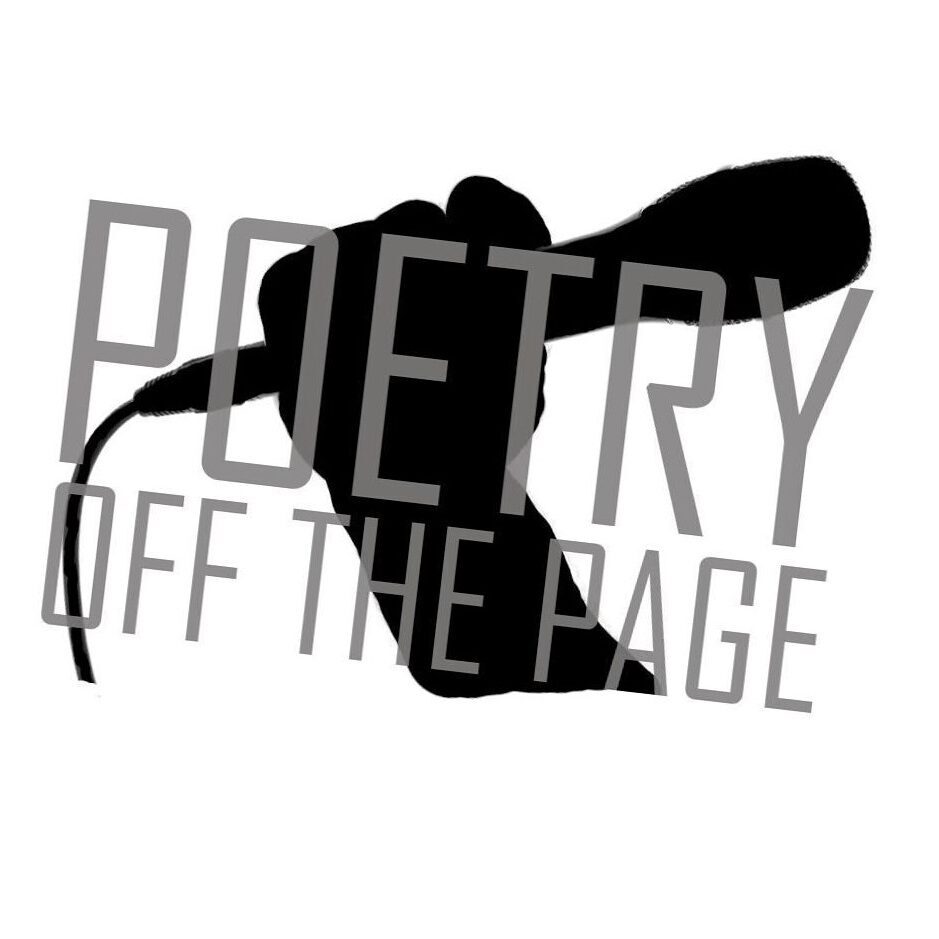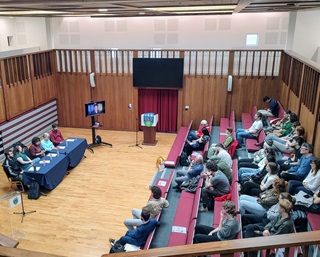by ELISE BROUWER and ROSS EVANS
On Thursday the 24th of April 2025, the Poetry Off the Page project, in collaboration with Boundless and Bare and University College Dublin, held an event in UCD’s FitzGerald Debating Chamber. The event, titled ‘Poetry Off the Page: Past, Present, Future’, aimed to create a public space to consider how poetry in performance in Ireland. The goal was to explore how performed poetry has developed, how it is being preserved and attended to (through archives, academic study, and popular discourse), and what the future of performance poetry might look like.

The event was well-attended by UCD staff, students, and members of the public, and the varied audience honoured one of the aims of the event: to dissolve the boundary between academic and public-facing notions of poetry. One reason why UCD was chosen as a venue was the interest that the student body has in performance poetry, particularly the current MA Humanities students, who have hosted and performed in open-mic sessions throughout the year. As such, the event was a valuable arena for the group to hear from those working on all sides of performance poetry and get a sense of the relationship between the practical and creative aspects of the spoken word sphere.
The event began with an introduction by the host and main event organiser, Claire Palzer, a PhD researcher of poetry performance in Ireland, based at the University of Vienna. Her introduction was followed by Emmet O’Brien’s fifteen-minute set, consisting of three poems. His first poem was about his getting into poetry, framing writing as a spell that drew out his own artistic instincts. His second negotiated notions of performance and class, drawing on the judgement he has faced over his accent in certain poetry circles. He recounted descriptions of himself that refused to call him a poet, instead dubbing him a rapper, or an “urban street poet”. His poem reiterated the idea that there is no archetype for a poet, and that great writers can come from anywhere. In the introduction to his third poem, he touched briefly on the nature of commissions, which then became a major talking point during the roundtable. He described a request he had received to write a piece about violence against women, and the discomfort he experienced because he felt that his was the wrong voice to address the topic. However, after further research and reflection, he wrote “Stand Together Today for a Better Tomorrow” which explores the cycle of complicity in gendered violence and what it takes to break it.

After O’Brien’s set, the roundtable began, moderated by Palzer and featuring O’Brien, UCD’s Dr. Lucy Collins (founder of the Irish Poetry Reading Archive), Boundless and Bare founder and co-organiser of the event Melissa Ridge, and poet Stephen James Smith. Also in attendance was Ó Bhéal’s Paul Casey, who joined virtually. Palzer began the discussion by asking each participant to define their relationship with spoken word and identify the aspects of the form that most interest them. Ridge began by outlining the connection performance poetry creates to the oral tradition, before explaining her enjoyment of the form’s spontaneity, where the same poem can be performed two entirely different ways, which she noted that O’Brien had demonstrated during his set. Collins also expressed admiration for the fluidity of the form and the breadth of what “performance poetry” as a term means, using the example of a rap poet at the Yeats Summer School who layered into his work his experience of the week, resulting in a poem that completely transformed with each day that passed. Smith highlighted the creation of a community and the potential for connection, while O’Brien detailed the form’s growth beyond the grassroots level and the voice it gives non-academics for whom certain poetry spaces are otherwise inaccessible. Casey concluded this part of the discussion by pinpointing a specific affordance of performance: being able to make eye contact with the audience, which creates an immediacy he relishes in live poetry.

Palzer then asked each participant about their inspirations, and how they think spoken word might fare if it enters the mainstream. O’Brien began by mentioning some influences from outside conventional poetry, including cinema (Saul Williams’ Slam), theatre (panel member Stephen James Smith’s Three Men Talking About Things They Kinda Know About) and music (indie rock band The Streets), before asserting that it will never lose its revolutionary qualities, because it always exists to comment on the status quo. Ridge celebrated its intervention in the mainstream, recounting her delight at hearing spoken word pieces in the music of Beyoncé, and the recent trailer for 28 Years Later. Smith was more reticent in his answer, believing that poetry should always exist on the fringes, but also mentioned doing commissions and the slight discomfort of reconciling the two. He concluded his point by discussing a favourite performance of his own, done over a megaphone in chip shops and bookmakers. Palzer expressed admiration for the adaptability of poetry performances to different spaces and how this enhances the conviction that poetry should exist everywhere. Collins, in her role as an events organiser, suggested that setting shouldn’t predetermine the material, and that the same work should be welcomed in both academic and festival settings. She detailed how the use of physical space lifts limitations on poets who thrive on performance and theatricality. Collins described this as reading specifically for an audience, reinforcing the idea of creating a moment that exists exclusively in the room and moment the piece is read in. This reflection honoured the “present” component of the afternoon’s theme.
The conversation then turned to poetry collectives. O’Brien distinguished between the state of collaborations now versus the ones he participated in at the start of his career. He discussed how collectives can have different aims, and therefore different outcomes. Some collectives he has worked with are focused on promotion, which clashes with his resistance to being “pushed” in one direction. O’Brien explained that while he does commercial work, it is not the work that inspires passion in him. Smith, similarly, explained that he was more involved in collectives in his earlier career, describing his current status as being a “lone wolf”. He did recommend that poets consider joining collectives, however, seeing it as an effective way of getting immediate feedback and developing one’s artistic voice.
The roundtable concluded with a question that honoured the “future” aspect of the event, as Palzer invited the panel to imagine what the future of performance poetry could look like. Smith began by saying he was simply looking forward to discovering a new poet at the open mic. Ridge and O’Brien addressed the performance poetry landscape in a broader sense. The former expressed a desire to see more legitimised funded spaces to foster the growth of performance poetry, while the latter predicted that spoken word will become recognised as its own distinct form separate from “traditional” poetry. Collins provided a variation on this, suggesting that the two forms would benefit from more overlap between their audiences, a connection between counterculture and the literary establishment that would make for a more varied, accessible, and creative performance space. The roundtable was followed by a Q&A, in which students and other guests were able to inquire further about the topics discussed and offer their own valuable insight.
With the roundtable concluded, Stephen James Smith took to the stage. His performance began with a rendition of Pat Ingoldsby’s piece on Gestalt therapy “It’s Okay”, carrying on from the discussion on influences. He then performed his own “We’ll All Rise”, emphasising the musicality in his voice and showcasing a unique quality of live performance that cannot be exactly replicated on the page. He returned to the idea of inspiration and the creative lineage he feels privileged to be a part of, inviting spectating poet Máighréad Medbh to perform. She performed her poem “Coming Out”, an exploration of her sexuality, which served as the climax to the first portion of the event.

With the first half of the event concluded, the open mic session began, hosted by UCD students and event co-organisers Elise Brouwer and Ross Evans. This section of the afternoon consisted of seven scheduled performances, before the pair opened the floor to those who had not applied for an open mic ticket but were inspired to read, and a final participant performed. The subject matter of each poem differed widely, spanning the Irish language, the loneliness of studying abroad, the lingering trauma of a Greek train crash, the recurring mundane sensations that form one’s daily grind and the ensuing numbness, and a poem dedicated to the patrons of poetry. This reflected the rich diversity of the performers who participated, a mix of students and members of the public alike.
In many ways, this variety reflected the answer that the roundtable reached in its discussion of performance poetry’s past, present, and future: that a diversity of voices and accessible spaces to platform them will always be the key to keeping the scene meaningful and alive.
Photo credit: ELISE BROUWER

